For the last few years, when the holiday season has come around, we've looked back to previous centuries for the newsworthy events of the year. Please join me on a whistle-stop tour one hundred years back in time, to 1912:
Roosevelt Saved by The Written Word
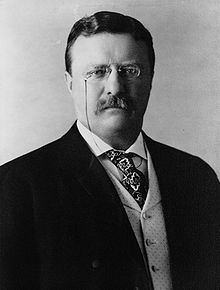 It's a Presidential election year in the USA and there's a rare 4-way race - two Republicans, one Democrat and one Socialist. The Republican Party is split between the conservative wing led by President William Howard Taft and the liberal/reform wing, led by ex-President Theodore Roosevelt.
Roosevelt is saved from an assassination attempt by a 50 page speech in his jacket pocket which takes much of the shot's impact, but the bullet still lodges in his chest. Just a few minutes later he opens his speech saying, "Friends, I shall ask you to be as quiet as possible. I don't know whether you fully understand that I have just been shot; but it takes more than that to kill a Bull Moose."
He proceeds to deliver his speech in its full 90-minute glory. Later, doctors decide that the bullet is too dangerous to remove, so Roosevelt will carry it until the day he dies.
It's a Presidential election year in the USA and there's a rare 4-way race - two Republicans, one Democrat and one Socialist. The Republican Party is split between the conservative wing led by President William Howard Taft and the liberal/reform wing, led by ex-President Theodore Roosevelt.
Roosevelt is saved from an assassination attempt by a 50 page speech in his jacket pocket which takes much of the shot's impact, but the bullet still lodges in his chest. Just a few minutes later he opens his speech saying, "Friends, I shall ask you to be as quiet as possible. I don't know whether you fully understand that I have just been shot; but it takes more than that to kill a Bull Moose."
He proceeds to deliver his speech in its full 90-minute glory. Later, doctors decide that the bullet is too dangerous to remove, so Roosevelt will carry it until the day he dies.
Roosevelt and Taft receive 27% and 23% of the vote, losing to Woodrow Wilson with 42%. The socialist candidate, Eugene Debs, wins 6% - the party's best presedential performance, winning over 10% of the vote in Nevada, Oklahoma, Montana, Arizona, Washington and Idaho.
Frank Baum and the Suffragettes
Frank Baum, best known for his Oz series, publishes no less than four books in 1912, (actually probably six but two have been lost to posterity), two rather unsuccessful ones under his own name and two under one of his many pseudonyms, Edith Van Dyne, in which his female protagonists take part in traditionally masculine activities. Baum's support of women's suffrage wasn't limited to a few books written under a pseudonym; he was active in the movement for many years, acquainted with Susan B. Anthony, and included strong female leads in many of his books, not least in the second Oz book, The Marvelous Land of Oz, in which a female general leads the women of Oz in a successful revolt armed only with knitting needles. He will die in 1919, the same year that Congress submits the 19th Amendment to the states for ratification, giving women the right to vote.
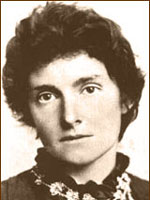 In Britain, 54-year-old Edith Nesbit has long established herself as a household name with dozens of books for children, published as E. Nesbit, plus many lesser known poems and books for adults. In 1912 she publishes The Magic World, a collection of twelve short stories for children. Nesbit was an outspoken feminist and socialist, a follower of utopian socialist William Morris, and a founder of The Fabian Society - a socialist organization which aimed to advance socialism via reform rather than revolution.
In Britain, 54-year-old Edith Nesbit has long established herself as a household name with dozens of books for children, published as E. Nesbit, plus many lesser known poems and books for adults. In 1912 she publishes The Magic World, a collection of twelve short stories for children. Nesbit was an outspoken feminist and socialist, a follower of utopian socialist William Morris, and a founder of The Fabian Society - a socialist organization which aimed to advance socialism via reform rather than revolution.
H.G. Wells was another early member of the Fabian Society (although later became critical of the organization believing that they had a poor understanding of economics and educational reform). By 1912, most of of his best known science fiction books are long behind him, but he's no less prolific, turning his focus towards politics and social commentary, in particular on the "New Woman" and the Suffragettes.
Tarzan, Avonlea and A Death in Venice
There's not much sign of feminism in Arthur Conan Doyle's The Lost World - in which an expedition finds itself knee-deep in dinosaurs somewhere in the middle of the Amazon basin and we first meet Conan Doyle's new protagonist, Professor Challenger. Apparently, like Sherlock Holmes (who first appeared in 1887), Professor Challenger is based on a real person - a Scottish physiologist by the name of William Rutherford, who one must imagine was less pleased with being immortalized in print as "a homicidal megalomaniac with a turn for science" than Scottish doctor Joseph Bell, the inspiration for the asute and logical Sherlock Holmes.
 Back in the USA, manly men still rule the roost in the world of Edgar Rice Burroughs. 1912 sees the serialization of his first Tarzan book, Tarzan of the Apes; and the first in his Barsoom series, starring John Carter of Mars. The list of future authors who will be inspired by the Barsoom series reads like a who's who of 20th century science fiction. As for Tarzan, Burroughs will go on to write about two dozen sequels; and there will be many film and comic adaptations.In Canada, Lucy Maud Montgomery publishes Chronicles of Avonlea, a collection of short stories starring her best known character, feisty Anne of Green Gables (first introduced in 1908). Despite considerable independent wealth from her books and, it would appear, strong sympathies for the independence of women, the 35-year-old Montgomery gets married in 1912 because, in her words, it is "a necessary choice for women in Canada."
Back in the USA, manly men still rule the roost in the world of Edgar Rice Burroughs. 1912 sees the serialization of his first Tarzan book, Tarzan of the Apes; and the first in his Barsoom series, starring John Carter of Mars. The list of future authors who will be inspired by the Barsoom series reads like a who's who of 20th century science fiction. As for Tarzan, Burroughs will go on to write about two dozen sequels; and there will be many film and comic adaptations.In Canada, Lucy Maud Montgomery publishes Chronicles of Avonlea, a collection of short stories starring her best known character, feisty Anne of Green Gables (first introduced in 1908). Despite considerable independent wealth from her books and, it would appear, strong sympathies for the independence of women, the 35-year-old Montgomery gets married in 1912 because, in her words, it is "a necessary choice for women in Canada."
Beatrix Potter is also getting married. She becomes engaged to country solicitor William Heelis in the summer of 1912 but doesn't tell her parents for some time as, despite being 45 years old and independently wealthy from her writing, she knows her parents will disaprove of the lowly marriage - and she's right - they do. The couple marry the following year and live happily for over thirty years until Potter's death aged 77.
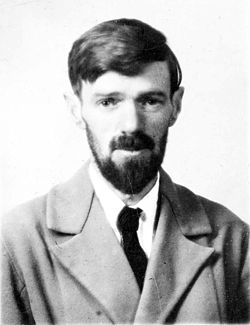 Elsewhere in England, D. H. Lawrence, the 27-year-old-son of a barely literate coal-miner, is also bucking convention. Having recently abandoned teaching to write full time he falls in love with Frieda Weekley who, inconveniently, is married to Lawrence's former modern language professor and the mother of three children.
Elsewhere in England, D. H. Lawrence, the 27-year-old-son of a barely literate coal-miner, is also bucking convention. Having recently abandoned teaching to write full time he falls in love with Frieda Weekley who, inconveniently, is married to Lawrence's former modern language professor and the mother of three children.
The following year Lawrence writes in a letter, "I should like to know why nearly every man that approaches greatness tends to homosexuality, whether he admits it or not..." German novelist Thomas Mann would likely have agreed with this sentiment. In 1912, he writes Death in Venice (Der Tod in Venedig) in which an elderly writer becomes obsessed with a 14-year-old Polish boy, Tadzio, who he never speaks to, let alone touches. Apparently the character of Tadzio was inspired by a 10-year-old boy that Mann, staying in Venice with his wife and brother the year before, spotted from his hotel window. It would be another dozen years before the first of Mann's works would be translated into English.
Change in China, Unrest in Russia
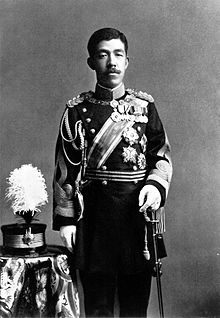 In China, the Qing Dynasty comes to a crashing end after 268 years of rule as The Republic of China is proclaimed, and the Kuomintang, the Chinese nationalist party, is founded. Across the waters, the Japanese mourn the passing of Emperor Meiji and welcome his son Yoshihito (Taisho) as the new Emperor. Suffering from poor health all his life Yoshihito will die aged 48 after reigning for 14 years, leaving Japan (then the ninth largest economy in the world and the third strongest naval power) to his son, Hirohito, who will rule from 1926 to 1989.
In China, the Qing Dynasty comes to a crashing end after 268 years of rule as The Republic of China is proclaimed, and the Kuomintang, the Chinese nationalist party, is founded. Across the waters, the Japanese mourn the passing of Emperor Meiji and welcome his son Yoshihito (Taisho) as the new Emperor. Suffering from poor health all his life Yoshihito will die aged 48 after reigning for 14 years, leaving Japan (then the ninth largest economy in the world and the third strongest naval power) to his son, Hirohito, who will rule from 1926 to 1989.
In Russia, Vladimir Lenin's Bolshevik faction breaks away from the Russian Social Democratic Labour Party. The term Bolshevik (literary "majority") will be deemed redundant by Joseph Stalin 40 years later when he declares, "Why should we call ourselves Bolsheviks? We are not the majority, but the whole party." Earlier in the year, Tsarist troops kill 500 striking workers in Lena, Siberia. Speaking of the event, Stalin will observe that "the Lena shots broke the ice of silence, and the river of popular resentment is flowing again. The ice has broken. It has started!"
In South-Africa, the African National Congress is founded in response to injustices against black South Africans at the hands of the government. Eighty-two years later, South Africa's first multi-racial elections will be held and the ANC, led by Nelson Mandela, will take power. Meanwhile, the rest of the continent of Africa has been neatly carved up between the European colonial powers, although there's still a degree of elbowing going on, which is formalized by the Treaty of Fez in 1912 which leads to Morocco becoming a French protectorate, while what is now The Republic of Congo transfers to German control.
War in Europe, Vitamins & Continental Drift
South-Eastern Europe is bristling with sabre ratling that turns to war by the year's end. In September mass demonstrations in Athens demand the liberation of Greece from Ottoman rule. A month later Montenegro declares war on The Ottoman Empire triggering the First Balkan War. The combined armies of the Balkans quickly defeat the limited local Ottoman forces. A year later, Bulgaria, dissatisfied with its share of the land-grab from this war, attacks its former allies Serbia and Greece, triggering a second war. A further year later, in July 2014, the assasination of the heir to the Austra-Hungarian throne in Bosnia, combined with the imperialistic ambitions of the great powers of Europe and a complex web of interlinked treaties, will embroil Europe in the Great War of 1914-1918.
Elsewhere in Europe, the Olympic Games take place in Sweden, American Harriet Quimby becomes the first woman to fly across the English Channel; the United Kingdom establishes the Royal Flying Corps (the forerunner of the Royal Air Force); Merck files patent applications for the production of MDMA (Ecstasy); German Alfred Wegener proposes the theory of continental drift; and Casimir Funk identifies vitamins.
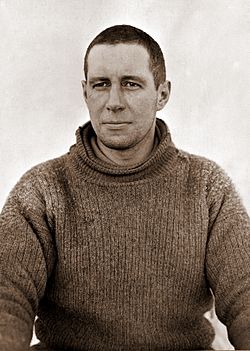 Very far from home, British polar explorer Robert Falcon Scott leads a small team in the hope of being the first to reach the South Pole. The expedition successfully arrives at the Pole but finds find that a Norwegian group led by Roald Amundsen has beaten them by five weeks. None of the five men will make it home alive. Edgar Evens dies in a fall; Lawrence Oates, barely able to walk and knowing he is a burden on his companions, leaves the tent and walks out into the snow to die. Scott records his parting words in his journal: "I am just going outside and may be some time." His sacrifice is not enough to save his companions, who die in their tent about three weeks later during a long blizzard.
Very far from home, British polar explorer Robert Falcon Scott leads a small team in the hope of being the first to reach the South Pole. The expedition successfully arrives at the Pole but finds find that a Norwegian group led by Roald Amundsen has beaten them by five weeks. None of the five men will make it home alive. Edgar Evens dies in a fall; Lawrence Oates, barely able to walk and knowing he is a burden on his companions, leaves the tent and walks out into the snow to die. Scott records his parting words in his journal: "I am just going outside and may be some time." His sacrifice is not enough to save his companions, who die in their tent about three weeks later during a long blizzard.
The Titanic, Harry Houdini & The Science of Chili Peppers
Meanwhile, Europeans are emigrating in droves to the USA, some snag a berth on the RMS Titanic, offering a previously unknown level of shipboard comfort, not just to its first class passengers but also to those in 2nd and 3rd class. About 2,224 people are aboard during the magnificent ship's first journey. Only about one-third will make it to America, including almost all the children in first and second class, most of the women in first and second class, and about half of those in 3rd class. Just 20% of the men survive; even in 1st class, only 33% make it to safety.
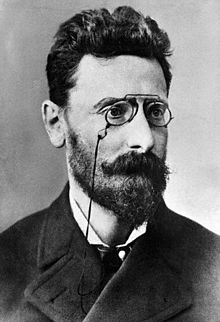 For those who have successfully made it to the USA, the country is bursting with innovation and change. New Mexico and Arizona become the 47th and 48th US states; Juliette Gordon Low founds the Girl Scouts; Boston's Fenway Park opens; and the Columbia School of Journalism is founded, thanks to a legacy in Joseph Pulitzer's will. Elsewhere, Albert Berry makes the first parachute jump from a flying airplane; Harry Houdini escapes from a locked steel and glass tank of water while hanging upside-down; Paramount Pictures is incorporated; Edison introduces the first home film-projector; and pharmacist Wilbur Scoville earns a place in history with the invention of the Scoville scale to measure the heat of chili peppers.
For those who have successfully made it to the USA, the country is bursting with innovation and change. New Mexico and Arizona become the 47th and 48th US states; Juliette Gordon Low founds the Girl Scouts; Boston's Fenway Park opens; and the Columbia School of Journalism is founded, thanks to a legacy in Joseph Pulitzer's will. Elsewhere, Albert Berry makes the first parachute jump from a flying airplane; Harry Houdini escapes from a locked steel and glass tank of water while hanging upside-down; Paramount Pictures is incorporated; Edison introduces the first home film-projector; and pharmacist Wilbur Scoville earns a place in history with the invention of the Scoville scale to measure the heat of chili peppers.
In Europe new works by Debussy, Elgar, Ravel and Strauss are being performed; but in the USA, new sounds are starting to fill the newly regulated airwaves. Irving Berlin's songs are all the rage, and William Christopher Handy publishes the music for Memphis Blues. Handy's style of 12-bar blues is credited with inspiring Vernon and Irene Castle's foxtrot which they will perform in Watch Your Step, Irving Berlin's first Broadway show in 1914.